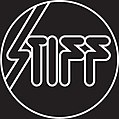Title: (I'd Go the) Whole Wide World
Artist: Wreckless Eric
Year: 1977
Album: A Bunch of Stiff Records
Tonight, a break from spotlighting artists and their music (sort of) to celebrate an upstart record label that found itself in the right place at the right time and made a splash with its savvy signings and unusual marketing techniques. Formed in 1976 in London, Stiff Records arrived just in time to capitalize on the punk spirit running rampant in the UK but signed artists that would usher in the new wave era. The compilation A Bunch of Stiff Records boasts a lineup that includes Nick Lowe, Elvis Costello, Dave Edmunds, Graham Parker, Motörhead and Wreckless Eric. Subsequent signings of Ian Dury, Madness and The Damned brought even greater success.
The label was expert at producing effective promotional campaigns, combining several artists into package tours with a different headliner each night and using guerilla tactics to promote their artists. One such tactic landed Elvis Costello in jail when he was arrested for unauthorized busking outside of a London meeting of CBS Records executives in protest of a lack of label support in the USA. (Apparently, it worked as he was signed to Columbia Records, a CBS affiliate, a few months later.) Other schemes included postering over unwitting record stores with ads for their records.
I must admit I was unfamiliar with Wreckless Eric's "(I'd Go the) Whole Wide World" before its prominent use in the 2006 film Stranger than Fiction. In the film, Will Ferrell attempts to fulfill his dream of learning the guitar upon hearing a prognostication of his untimely death. Early in his study, he is encouraged to play a song by his love interest, played by Maggie Gylenhaal. Setting aside his nerves, Ferrell reluctantly performs "Whole Wide World" as it falls within his current skill set of two chords. (Click here for a video of the scene.)
How can a song with only two chords be so enticing? It's a bit of a mystery really—I mean, the vocal melody of the verse consists of only two notes! But the answers are found in the building blocks of form: repetition and variety. The repetition is obvious (two chords, same vocal melody). Some readily apparent examples of variation can be found in the arrangement (bass solo w/tom-toms; contrasting drum patterns; guitar arpeggios; hand-claps; vocal doubling on the chorus)—the song is well-appointed given the limited instrumentation. But there are a few subtle things that I find really effective. The first is the one-line sneak preview of the chorus that occurs at 0:26. Another is the extended second line of the chorus, in which a 2/4 measure is inserted to accommodate the extra syllables in the line find out where they hide her. And while this is a more obvious thing and an attribute of the arrangement, I think the modified cha-cha rhythm of the chorus goes a long way toward making the song unique. Two chords never sounded so good!
Feel free to reply with your favorite two-chord songs. It's free!

It isn't hard to find a Velvet Underground song with 2 chords, but I think Heroin is worth a mention. It clocks in at 7 minutes but maintains interest despite it's simple I-IV progression. The tempo and dynamics change drastically but everything is glued together with these two chords, John Cale's droning viola and Lou Reed's lyrics from the perspective of a user. (There is an occasional V in a guitar riff but IMO it still is a two-chord song).
ReplyDeleteTo be honest.....(pauses to check and see if there are any hipsters lurking)....I find "Heroin" to be a much less impressive/satisfying use of two chords because it lacks any sort of conventional song structure (i.e. verse-chorus). Not saying it's not good (also not saying it is good) but just not as interesting to me as, say, "Masters of War" or "Jane Says" or "Horse With No Name" (which may or may not have a third chord—hard to tell). Good one, though! You win the prize!!
DeleteI think it is a lot like "Masters of War" or many of those early Dylan songs. It is strophic (verse, verse, verse...) and ends with the refrain of "I guess I just don't know, well I guess I just don't know" (except for when Cale's viola goes haywire).
Delete"Masters of War" has a regular number of bars per verse but lacks a refrain. "Heroin" is more like Dylan's "Hard Rain's a Gonna Fall" or "Lonesome Death of Hattie Carroll" with verses that contain a varying number of bars in order to tell the story. I do think there is a structure in "Heroin" but it definitely leans towards the side of being through-composed.
I find people love or hate this song (and the VU in general). I fall into the former camp. (Does that make me hipster?)
"(Does that make me hipster?)"
DeleteYes.